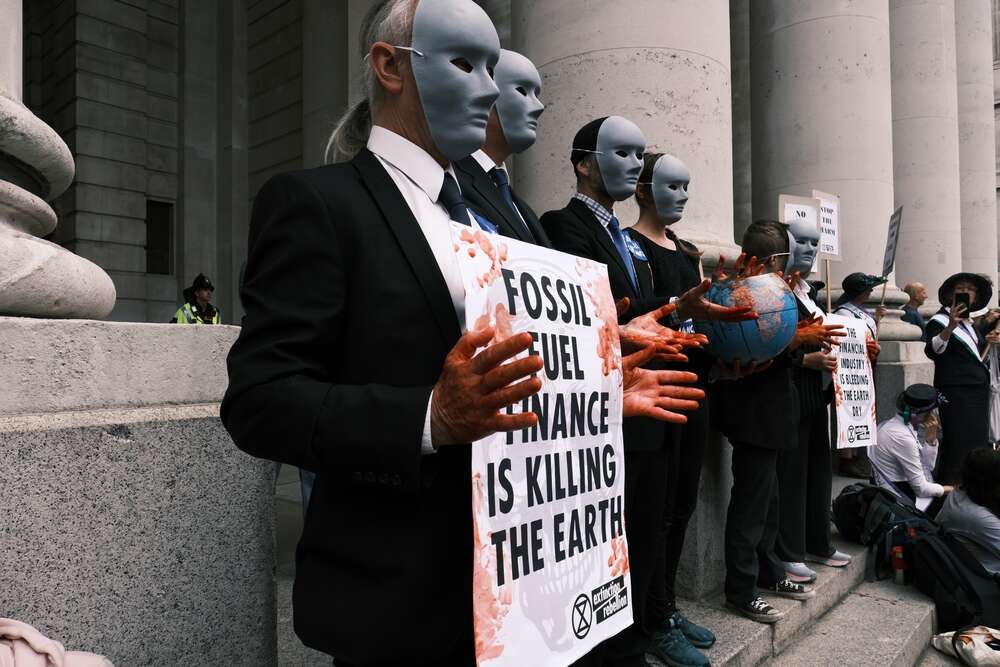

- Since the Paris Agreement, the world’s 60 largest banks have financed fossil fuels to the tune of $5.5trn.
- Royal Bank of Canada (RBC) grabbed the top position as the largest financier of fossil fuels this year, up 4.2% to $42.1bn.
- None of the biggest funders of fossil fuels has seen their share prices hit in any way since the report’s publication.
The disconnect between public outrage at climate change and what investors do with their money remains as strong as ever.
Last week saw the publication of the 14th annual Banking on Climate Chaos report. Authored by Rainforest Action Network, BankTrack, Indigenous Environmental Network, Oil Change International, Reclaim Finance, Sierra Club and Urgewald, it made for familiar reading.
In the seven years since the Paris Agreement was adopted, the world’s 60 largest banks have financed fossil fuels to the tune of $5.5trn. The 60 banks profiled in this year’s report channelled $150bn of funding last year into the top 100 fossil fuel companies.
This included $10.1bn to France’s TotalEnergies, $12.8bn to Calgary-based TC Energy, $8.4bn to ConocoPhillips in the US and $8.9bn to Saudi Aramco, four of the world’s most aggressive fossil fuel expanders.
“What is especially notable about this year’s report was that 49 banks in the report have net-zero commitments, but still provided 81% of the financing to the top 100 companies expanding fossil fuels. These banks must now revisit their climate transition plans and remove any loopholes that allow them to continue to finance fossil fuel expansion,” says Josh Williams, climate finance lawyer at The Foundation for International Law for the Environment (FILE) in London.
Shouting into the void
The outrage was immediate and international. “[The banks’] lack of transparency and greenwashing finances false solutions like carbon offsets through fake net-zero emissions claims,” says Tom Goldtooth, executive director at the US-based activist coalition Indigenous Environmental Network. “True climate action requires keeping fossil fuels in the ground,” he notes.
While Lucie Pinson, director and founder of Paris-based think-tank Reclaim Finance, adds: “The approach that the banks have embarked on is not only doomed to failure, [but] it is also a recipe for suffering.”
There is just one problem. The banks haven’t even had the gentlest of slaps on the wrist from the stock market since the report was published.
Toronto-headquartered Royal Bank of Canada (RBC) grabbed the top position as the largest financier of fossil fuels in 2022. Nonetheless, RBC shares have not been impacted by the news. Before the report, they were trading at $98.35 and at the close on 17 April at $99.42.
The report points out that the Canadian bank provided $42.1bn in funding for fossil fuel companies last year. This is up 4.2% from $40.4 in 2021 and makes for a total of $253bn since 2016.
“RBC is moving in completely the wrong direction, dragging our climate ambitions backwards and positioning Canadian banks as fossil fuels’ lenders of last resort,” says Richard Brooks, climate finance director at environmental organisation Stand.earth.
It is a similar story for other fossil-fuel-funding leaders. J.P. Morgan Chase continues to finance the fossil fuel sector at pace since the Paris Agreement [see chart]. In 2022, it financed fossil fuels to the tune of $39bn, making a total of $434bn since 2016.
In a memo to J.P. Morgan Chase shareholders in April, the pressure group The Union of Concerned Scientists asked them to vote in favour of “a time-bound phaseout of financing for new fossil fuel development and exploration” at the bank’s upcoming annual meeting on 16 May.
The letter’s signatories are also encouraging the bank’s shareholders to support all other resolutions that would promote the rapid decarbonisation of the economy, protect Indigenous sovereignty and advance a just transition to clean and renewable energy.
Despite the furore and pressure, J.P. Morgan Chase’s shares were trading at $129.52 before the report’s publication and closed at $139.82 on 17 April.
The lure of profits
It was a similar story at Mitsubishi UFJ Financial Group (MUFG), which ranks as the biggest funder of fossil fuels amongst Asian banks. Despite financing fossil fuels to the tune of $29.5bn last year, its shares have risen from $6.45 before the report's publication on 13 April, to $6.50 on 17 April. And while the French bank BNP Paribas’ fossil fuel funding rose 26% last year to $20.8bn, its shares have also risen from €57.17 ($62.61) to €58.19 during the same time frame.
It was exactly the same for those banks that increased their funding of fossil fuels.
Pittsburgh-headquartered US bank PNC last year saw its fossil fuel funding rise a hefty 77.3% to $5.5bn and has seen its shares rise from $119.57 to $125.12. While Chinese banks ICBC and China Citic saw funding rise 23.7% and 31.5% to $4.2bn and $4bn respectively. They have seen shares jump 3.7% and 7.8% respectively to Rmb4.77 ($0.69) and Rmb6.11 respectively.
“The world’s biggest banks have continued to funnel trillions of dollars into the fossil fuel industry including new coal projects – knowingly driving the world closer to climate disaster in pursuit of greater profits,” says Bevis Watts, chief executive of Triodos Bank UK, an ethical bank headquartered in Zeist, the Netherlands.
“We cannot achieve a greener future without coordinated action from the global financial system, and we need it to act now,” concludes Watts.
The trouble is that it's very hard to shake off the lure of profits.
[Read also Why La Banque Postale leads banking world on climate action]






